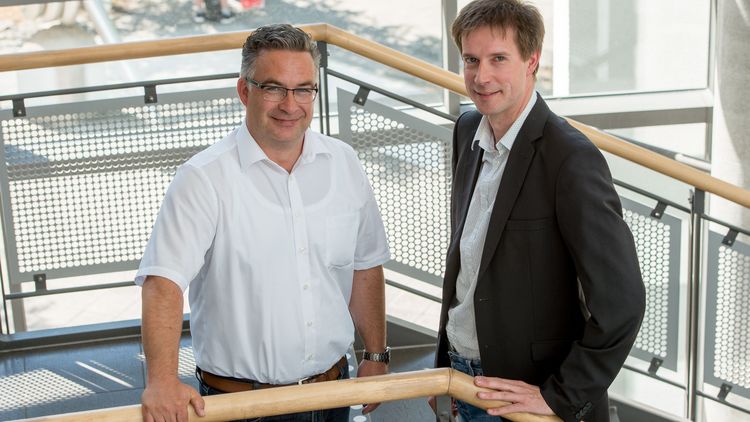Why do nearly one in three students in Germany drop out of higher education? The reasons can be manifold but there has been little systematic research on the subject to date. In order to change this Michael Feldhaus and Karsten Speck are embarking on new paths in their research project LAST. Their aim is to get a picture of the real life of students.
Memories are deceptive. Was the difficult statistics exam really the rea-son for dropping out of college? Or had the doubts set in long before that? Perhaps when the father smugly asked whether a degree in sociology was really going to pay the bills? Or when a for-mer classmate drove up in a fancy car?
According to recent statistics released by the German Centre for Higher Education (DZHW), in Germany around 30 percent of undergraduates leave university without a degree. Just under half of them leave in the first or second semester and the remaining 29 percent in the following year. There are some science subjects where drop-out numbers are especially high. For example, according to the DZHW, ap-proximately one in two maths students throw in the towel, and the numbers are only slightly lower for informatics and chemistry students. Hardly any research has been conducted into the reasons behind this phenomenon, and the consequences are also unclear. A study conducted by the Stifterverband for German Science in 2007 showed that the negative impact should not be underestimated – either for those who drop out and have to overcome the sense of having failed to find new ways into professional life, or for society, which depends on young people with a university education especially in times where the workforce is short of qualified individuals. The study estimates the economic damage at 2.2 billion euros a year.
Social and educational contexts
But why do young people turn their backs on lecture halls? And what can universities do to stop them? These are the questions sociologist Prof. Dr. Michael Feldhaus and educationalist Prof. Dr. Karsten Speck hope to find answers to. For their research project “Life Course Perspective and Dropout from Higher Education (LAST) – a multicontextual analysis of the causes and consequences of dropout from higher education” they have been conducting a survey among Oldenburg University students since April 2017. The Federal Ministry of Education and Research is financing the three-year project as part of the funding line “Academic Success and Dropout Phenomena”. In order to ensure data compatibility with nationwide studies such as the DZHW, the Oldenburg researchers have also developed their instruments in line with previous work on the subject.
As the project name suggests, Feldhaus and Speck aim to take into ac-count as many different living situations – or sociological and educa-tional “contexts” – as possible. “One could also say that we are trying to put together a picture of real life,” Feldhaus says. The team of researchers is therefore not only inquiring into how satisfied students are with the course structure or the quality of the teaching, but also into social factors such as their relationships with their parents, the education levels of their closest friends, relationships with fellow students and what their partners think about the subject they are studying. Then they are also looking into all the things that influence everyday life, such as how far they have to travel to college, whether they have to work to support themselves or whether they have children. Above all factors that lie beyond the university’s sphere of influence have gone largely ignored in previous studies on college dropout phenomena. “We are convinced that their role should not be underestimated,” Feldhaus states.
When developing their catalogue of questions Feldhaus and Speck deliberately chose to cooperate with Olden-burg school teachers and special needs educationalists who research so-called absenteeism, or in other words why children and teenagers choose to skip school. Although the living situations of schoolchildren and those of students differ greatly simply because of the age difference, the researchers nonetheless believe their work benefits from this expertise. “Through our exchange with these colleagues we happened upon important influencing factors and connections of which we were previously unaware,” Speck says. He notes that for example there are children and teenagers who skip school to look after mentally ill parents at home. Family problems such as these can also be fac-tors for young adults, so at least they should be asked about it, he explains.
In cooperation with Dr. Nicola Al-brecht and Lisa Preller from the Department for Study Programmes and Teaching the LAST team wants above all to find out where the university can intervene to prevent students from dropping out, and in which cases the reasons lie beyond its sphere of influence. “If my partner gets a job in southern Germany and I really don’t want a long-distance relationship, it doesn’t matter how good the teaching is, I will still leave Oldenburg,” says Speck. In other cases improved social integration could be helpful. The evaluation of the first phase of the survey has already confirmed their approach. “As we suspected, we found direct correlations between the students’ environment and success in their studies,” Feldhaus says. For example, students who have lots of friends at university and feel well integrated are more motivated at lectures. A stable relationship with shared plans for the future also increases the motivation to learn. Further surveys will build on these initial results.
One Tuesday in June we witnessed a survey in action. In auditorium G the economist Prof. Dr. Jörg Prokop was talking about standard deviations, seventy or so students were sitting on the benches in the auditorium, industriously taking notes. Rouven Teichmann and Ana Brömmelhaus entered the room carrying cardboard boxes filled with questionnaires. The two research assistants in the LAST project nodded at Prokop, who promptly announced a break in his lecture. While Teichmann walked along the benches distributing the questionnaires, Brömmelhaus picked up the microphone and explained what the LAST study was about and why it was important that as many students as possible take part.
Response rate of almost 50 percent
“We handed out almost four thousand questionnaires and our response rate has been over 45 percent. We were totally surprised,” the research assistant explains later. Many similar surveys have had to struggle with diminishing participation rates for years now. Oldenburg students, however, have been quite happy to complete the LAST questionnaire during courses – in spite of its substantial length of 84 questions. “We did however offer incentives,” Brömmelhaus admits. Anyone who fills out the form gets a book voucher and can take part in a raffle to win a tablet.
The researchers are particularly keen to gather data from the students over a longer time period, which is why LAST has been designed as a longitudinal analysis, questioning the same people four times in total over a period of two years. A few markers are deliberately hidden in the questionnaires. For example, anyone who says they often seriously consider changing their main subject or have done so in the past attracts attention. “We will then look at how that person answers future questionnaires, or how they answered them in the past,” Speck explains. It could be, for instance, that they were already finding the exams difficult back then. Or that soon after meeting a new partner the partner expressed doubts about their choice of subject: “What, you really want to become a teacher?”. The longitudinal perspective makes it easy for the researchers to retrace these causal relationships. This precludes memory errors which, the researchers suspect, occur in studies that attempt to pinpoint reasons for dropouts in retrospect.
Another key part of the process are qualitative interviews – funded by the Department for Study Programmes and Teaching – which aim to build on the knowledge gained through the questionnaires. Here the researchers randomly select about forty students who have completed a questionnaire. “We know from the questionnaires for example that someone has to work in order to pay for their studies, but we don’t know how stressful this is for them. This is something we can find out in the interview,” Feldhaus explains. The focus of the interviews, which to inspire more trust are carried out by the research assistants, is primarily on students who are showing signs that they might drop out. “Their motives and assessments are particularly interesting for us because ultimately we want to find out how and if the University can help them,” Speck explains. It might help them to change subjects, he says, pointing out that the first round of surveys showed that this can increase motivation. “We need to relativize the spectre of dropping out. It’s not automatically a catastrophe, not every change is bad,” Feldhaus says. If by changing somebody ends up studying a subject that is closer to their heart, then the supposed failure of the first time round could actually turn out to be a good life choice. Even dropping out entirely can pay off for some people, he explains. “Especially if it happens early on, it can be a conscious decision that makes sense for that person in particular, also from an economic point of view,” Speck says. It is certainly better to look for alter-natives than to prolong extreme and long-term dissatisfaction with one’s studies, he adds.
What can the university do to support students with doubts? Previous studies have shown that it can make sense to be clearer about course requirements, to restructure the study plan, to be more transparent about how exam performance is assessed or to expand support services for students. In the summer of 2020, Michael Feldhaus and Karsten Speck will no doubt be able to point to other areas where those in charge can make adjustments – approved by real life.




